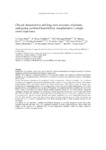Clinical Characteristics and Long-term outcomes of patients undergoing combined heart-kidney transplantation: a single-center experience

Ver/
Use este enlace para citar
http://hdl.handle.net/2183/19176
A non ser que se indique outra cousa, a licenza do ítem descríbese como Atribución-NoComercial-SinDerivadas 3.0 España
Coleccións
- INIBIC-ICATC - Artigos [156]
Metadatos
Mostrar o rexistro completo do ítemTítulo
Clinical Characteristics and Long-term outcomes of patients undergoing combined heart-kidney transplantation: a single-center experienceAutor(es)
Data
2015-01-30Cita bibliográfica
López-Sainz A, Barge-Caballero E, Paniagua-Martin MJ, et al. Clinical Characteristics and Long-term outcomes of patients undergoing combined heart-kidney transplantation: a single-center experience. Transplant Proc. 2015;47(1):123-126
Resumo
[Abstract] Background. The purpose of the study was to describe clinical characteristics and long-term survival of patients undergoing combined heart-kidney transplant in a single center.
Methods. We conducted a retrospective analysis of 22 consecutive patients who underwent combined heart-kidney transplant at our institution between 1995 and 2013. Long-term outcomes were analyzed by means of the Kaplan-Meier method.
Results. Four patients underwent re-do transplant (2 cardiac re-transplants, 1 kidney re-transplant, and 1 combined heart-kidney re-transplant). Most frequent underlying cardiac conditions were coronary artery disease (54%), dilated cardiomyopathy (23%), and chronic rejection of a previous heart graft (18%). Known causes of chronic renal dysfunction were nephroangioesclerosis (23%), drug-related toxicity (14%), and Wegener granulomatosis (5%). Non-specified chronic renal dysfunction was present in 50% patients. In-hospital postoperative mortality rate was 5 of 22 (23%). Causes of early death were directly related to kidney transplant surgery in 4 of 5 (80%) patients. Among the remaining 17 patients who surmounted the postoperative period, long-term survival rates 1 year, 5 years, and 10 years after HKT were 88%, 82%, and 65%, respectively. Over a mean follow-up of 6.7 ± 6.4 years, cumulative incidences of cytomegalovirus infection, coronary allograft vasculopathy, malignancy, and acute cardiac graft rejection were 41%, 6%, 24%, and 41%, respectively. There was no episode of acute renal graft rejection. At the end of follow-up, all survivors (n = 11) were in functional New York Heart Association class I. Mean creatinine serum level was 1.68 mg/dL.
Conclusions. In our experience, combined heart-kidney transplant is a feasible therapeutic option that yielded favorable long-term outcomes, with a low cumulative incidence of cardiac graft dysfunction. These results were obtained at the expense of a significant risk of early postoperative mortality, which was mainly related to complications of kidney transplant surgery.
Versión do editor
Dereitos
Atribución-NoComercial-SinDerivadas 3.0 España
ISSN
0041-1345
1873-2623
1873-2623






